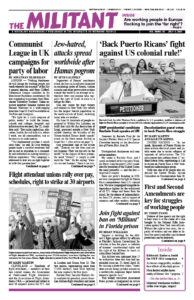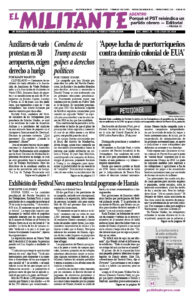Increasing numbers of Gazans have begun to speak out against Hamas, holding the group responsible for hurling them into eight months of war with Israel and bringing death and destruction into their lives.
“I do not want to sacrifice my life, my home and house for anyone,” including Hamas, Ameen Abed, a resident of Jabaliya told the New York Times for a June 16 article. “Who are you to impose this kind of life on me?”
While Hamas and even the Israeli hostages were in the underground tunnels, Gazans were above ground with no protection, he said. “There is uncontrolled anger against Hamas. It threw the Palestinian people into the bottom of the well.”
“If the death and hunger of their people do not make any difference to them,” Motaz Azaiza, a well-known Gaza photojournalist, wrote about Hamas in March, “they do not need to make any difference to us. Cursed be everyone who trafficked in our blood, burned our hearts and homes, and ruined our lives.”
Raed al-Kelani, who makes meals and distributes food aid in shelters for displaced Gazans, told the Times Hamas always acts in its own interests. “It started Oct. 7, and it wants to end it on its own terms,” he said. “Hamas is still seeking its slice of power.” Another Gaza resident, who recently fled to Egypt and asked the Times not to use her name for fear of repercussions against her family, said they tell her they don’t want the war to end before Hamas is defeated.
Since the Tehran-backed Hamas’ Oct. 7 pogrom in Israel — in which the Nazi-inspired outfit killed 1,200 people, wounded thousands more and tortured and raped civilians — the group has sought to rally support for their war on the Jews. “O, our people in all Arab and Islamic countries,” Muhammad Deif, head of Hamas’ military wing, said in a statement released at the time of the attack, “the day has come when anyone who has a gun should take it out. Now is the time. If you do not have a gun, take up your cleaver, hatchet, axe, Molotov cocktail, truck, bulldozer or car.”
Few respond to call for attacks
But few heeded his call. There remain plenty of Hamas supporters in Gaza, but the influence they wield has markedly weakened.
The majority of Palestinians, including those who blame Israel for the blockade on Gaza after Hamas came to power, say the killing or kidnapping of civilians is not permissible.
And in spite of Al Jazeera and other regional Arabic-language news media, which focus on Hamas’ figures on Palestinian deaths and destruction and don’t cover the atrocities committed by Hamas Oct. 7, more Palestinians are speaking out. And they do so in spite of the long history of violent response by Hamas to any criticism since the group took full control of Gaza in 2007 after ousting the Palestinian Authority’s security forces in bloody street battles.
“They [Hamas leaders] believe they planned for everything, but when it came to us they didn’t,” said Umm Ahmad, the wife of a Gazan blacksmith whose family has been displaced four times during the war. “I need a government that takes care of its people.”
Another recent report, in Canada’s National Post June 14, quotes a Gazan who says Hamas is far less popular than what media like the Qatar-financed Al Jazeera claims. He asked to remain unnamed because of earlier protests against Hamas he participated in.
He said he hopes Israeli forces stay until Hamas is routed and can be replaced by grassroots-area residents.

